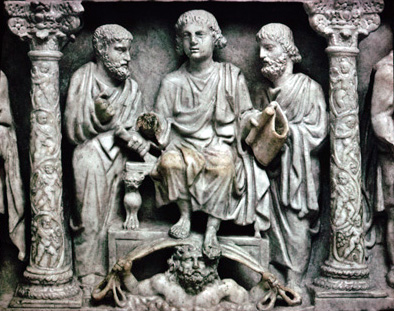|
Schedule and Requirements
Prevo's
Home Page
|
|
Website on Saint Augustine, his life and works (UPENN)
Report
of visits to Hippo and other northern African sites related to St.
Augustine.
Assignment: Read Books 2, 3, 7 and 8.
Discussion Schedule:
- First Discussion session - Books 2 and 3
- Second Discussion session - Books 7 and 8
- Check syllabus for paper 2 due date.
Discussion
questions (developed by Prof. James Arieti)
Book 2
1. When Augustine discusses his sexual behavior and sex in general, what
does he say was his aim and what does he say was not his aim in engaging
in sexual activity?
2. Why did the family of Augustine not channel his sexual proclivities
by compelling him to marry?
3. How did Augustine respond to his mother's warnings about sexual
misconduct?
4. Why did Augustine pretend to be worse than he actually was?
5. What did Augustine do with the pears he stole?
6. What in general are the motives for crime?
7. What does Augustine say about the relevance of these motives to his
theft of the pears?
8. Augustine says that all human acts are perverse imitations of God.
Give one of Augustine's examples of what he means.
9. How did acting in concert with his friends affect the stealing of the
pears?
Book 3 (you may skip chs. vi - ix)
10. What question does Augustine ask about the pleasure taken in
theater?
11. What actors do we praise the most?
12. Who are the most respected lawyers?
13. What was the effect of Cicero's Hortensius on Augustine?
14. What is the Hortensius about?
15. Why did Augustine prefer Cicero to Scripture?
16. What Manichaean absurdity did Augustine believe about a fig that is
picked?
Book 7 (you may skip chs. vii-xi [pp. 119-124] and chs. xix-xxi [pp.
128-132])
17. How does Augustine's example of an elephant and a sparrow illustrate
confusion in thinking of God in corporeal (i.e., bodily) terms?
18. Which of Augustine's friends comes up with an argument showing that
Manicheism is self-contradictory?
19. When Augustine has rejected Manicheism and, with it, its explanation
of the origin of evil, he looks for the origin of evil in free will.
What question does he ask about free will?
20. What does Augustine say constitutes "God's very self"?
21. What story convinces Augustine to reject astrology?
22. As Augustine picks up his discussion of evil in ch. xii, what sort
of things does he say are liable to corruption?
23. What would happen to things if they were deprived of all goodness?
24. What is Augustine's definition of "falsehood"?
25. What is Augustine's definition of "wickedness"?
26. Every now and again Augustine feels that he achieves a glimpse of
God, a union with the divine. But what makes this union short-lived?
Book 8
27. Saying that he is convinced of the truth of Christianity but is not
yet ready to commit himself, Augustine decides to visit Simplicianus,
who tells him the story of Victorinus. Who was Victorinus and what is
the important action that he performs?
28. Augustine says that we experience greater joy in stories with what
kind of plot?
29. What effect does the story of Victorinus have on Augustine?
30. When Ponticianus visits Augustine and Alypius, he tells about some
of his friends who chanced upon the Life of Antony and read it. What
decisions did the friends make as a result of reading this book?
31. As Augustine reflects on the decisions of others to dedicate
themselves to the Church and on his own inability to do so, what does he
think about himself?
32. Augustine utters his famous prayer, "Grant me chastity and
continence, but not yet" and laments that though he accepts the
truth of the Catholic Church, he is not yet ready to dedicate himself.
He also laments that people less educated than he have been able to make
the necessary commitment. In this confused frame of mind, to what part
of his lodging does he go?
33. What does Augustine say about the will to account for the fact that
while the body obeys the will, the mind does not?
34. Can there be rival evil wills? Can there be rival good wills? Answer
both questions giving Augustine's examples.
35. What does the vision of Lady Continence tell Augustine?
36. After flinging himself under a fig tree, what words does Augustine
hear from a child?
37. As Augustine reads a passage from Matthew, all his doubts are
dispelled. What are the reactions of Alypius and Augustine's
mother? (Keep the reactions distinct.)
38. What decision does Augustine make about marriage and his ambitions?
|
